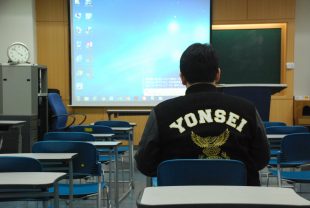The meaning of “jeong”
 “Coming to Korea as a tourist is vastly different from actually living here.”
“Coming to Korea as a tourist is vastly different from actually living here.”
Some say you can only truly know a country once you’ve passed a tourist’s honeymoon phase. And for Frederic Heng who hails from Singapore, the veil of his first impression of South Korea was gradually lifted over the 4 years he spent studying at Yonsei University in Seoul.
At first, it was the garbage; the way almost everything had to be separated out and recycled—the food waste with leftovers to put into small bags, and the recyclables in their own plastic trash bags each designated by color and size. “In Singapore you live in apartments and send all your trash (clothes and food) down a single chute and you never see it again.” It just didn’t register with Frederic that he had to pay for bags to throw his trash away.
Later, it was the toilets. Cleanliness cannot be emphasized enough back home, but in Korea, it took some time for Frederic to get used to different standards for restroom cleanliness. “We take our toilets very seriously.” In Singapore’s Changi Airport, people are asked to evaluate their bathroom experience after using one of the stalls; by a cool device attached to toilet doors.
But then, “there was this Korean concept of jeong”. The dictionary translates it to mean “affection”, but the nuances of the term imply a familial attachment amongst Koreans that is often extended to strangers. Without a strong grasp of the Korean language, there were many occasions where Frederic would have been seriously stuck if it had not been for some Koreans—absolute strangers—who went out of their way to help a foreigner in distress.
“I come from a very individualistic culture and it was difficult to respond to jeong which I had never really experienced before. It was hard to reciprocate that kindness.”
Of course, there are those unfriendly people on the subway who shout at foreigners that unknowingly sit on pink seats reserved for pregnant women…and there is a certain gap that just cannot be overcome because of different social perceptions, but Frederic has found that jeong is something unique to the culture—though it is also an aspect that has been decreasing as Korea, too, becomes more individualistic over time.
On a typical day, Frederic will be studying either on school grounds or in his quaint home not far from Yonsei East Gate, opting for the cheaper dosirak (“Korean lunchbox”) as his main meal. And on a “good week” he will have around 300-500 pages of readings to complete, characteristic of Korea’s heritage of education being very important for a person’s development and success. But that’s also found in Singapore, “maybe it’s an East Asian thing,” Frederic thinks aloud.
Hoping some day to work in the civil or foreign service in Singapore, Frederic dedicates each day to hard work, but he also reserves some of his personal time for traveling around Korea. He prefers traveling alone and often will up and by himself cheap air tickets to places like Daegu and Jeju Island, taking in the various scenery and sights belonging to the peninsula. “I don’t plan on staying in Korea, but I am open—open to all options.”























































